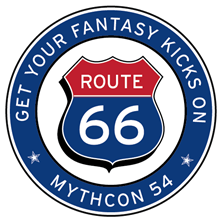Aims & Scope
Mythlore is a refereed scholarly journal. Mythlore welcomes submissions focusing on the works and scholarship of J.R.R. Tolkien, C.S. Lewis, and Charles Williams as well as articles on other authors of mythic and mythopoeic literature. We invite articles from all critical perspectives. All accepted articles must be recommended by at least one referee through our double-anonymized review process; in the case of authors connected with the journal or on the Society's board, a minimum of two recommendations is required. Notes and Letters are not refereed, nor are Reviews. We endorse "Anti-Racist Scholarly Reviewing Practices"; a link to this document is provided with our referee instructions. Please see our Publication Ethics page for our AI Policy.
The purpose of the Mythopoeic Society is "promoting the study, discussion, and enjoyment of fantastic and mythic literature." Mythlore contributes to this mission as the scholarly journal of the society.
Our audience is widely-read and well educated, but not necessarily academic. Writing should therefore be clear, accessible, and jargon-free. Unfamiliar terms and concepts should be concisely and unobtrusively explained.
Our subtitle is "A Journal of J.R.R. Tolkien, C.S. Lewis, Charles Williams, and Mythopoeic Literature."
What exactly is "mythopoeic literature"?It is literature that creates a new and transformative mythology, or incorporates and transforms existing mythological material. Transformation is the key—mere static reference to mythological elements, invented or pre-existing, is not enough. The mythological elements must be of sufficient importance in the work to influence the spiritual, moral, and/or creative lives of the characters, and must reflect and support the author's underlying themes. This type of work, at its best, should also inspire the reader to examine the importance of mythology in his or her own spiritual, moral, and creative development.
In addition to the obvious (criticism of mythopoeic literature by our major authors or any other author, reconsiderations of authors not normally considered mythopoeic, influence of mythopoeic authors on other writers and vice versa, etc.), some of the other kinds of papers Mythlore publishes include:
- Studies of other writings by our three key authors and other writers of mythopoeic literature, not all of which are mythopoeic fiction. Papers of this sort should address the relation of these other writings to the author's fiction and seek to provide keys for understanding it. For example, a study of Lewis's theological writings should consider how his theology is manifested in his fiction.
- Study of the sources incorporated in mythopoeic fiction. Again, these studies should provide us with keys to understanding mythopoeic fiction and should not simply list sources. For example, a study of echoes of Beowulf in Tolkien's work should demonstrate how the elements used contributed to Tolkien's themes, and how and why he transformed them in his fiction.
- Psychological interpretations of mythological symbol-systems in mythopoeic fiction and its sources in mythology and folklore. We tend towards Campbell and Jung rather than Freud; archetypes and the hero-journey rather than pathologies.
- Studies of other writers considered Inklings, Inklings-related, Inklings-influenced, or influences on the Inklings, particularly if similar themes and concerns appear in their work. For example, while Dorothy L. Sayers was not formally an Inkling, nor did she write fantasy, her friendship with several Inklings and her themes and theology are sufficiently in tune with those of our primary authors that she is a frequent subject of Mythlore papers.
We do NOT publish:
- Pure "Middle-earth studies" and the like. Articles which take as a premise that the mythopoeic creation of any author is real, or that fail to relate their work to the "mundane world."
- Specialized studies of Tolkien's invented languages. Other journals cover this area admirably, particularly those published by our society's special interest group The Elvish Linguistic Fellowship (http://www.elvish.org/).
- Fiction, poetry, fan fiction, fan art. (All but fan fiction may be submitted to our sister publication Mythic Circle.)
- Fiction book reviews, except for new editions of works or newly published works by Tolkien, Lewis, and Williams or classic works of fantasy with new critical apparatus. Film reviews except for documentaries about our three major authors. For more details see Mythlore Reviewer Instructions in the left column. (Fiction and feature film reviews may be submitted to our sister publication Mythprint.)
- Articles which simply list the mythical references in any given work.
- Evangelization. Religion and myth are intertwined expressions of the same impulse in humankind; therefore, it is inevitable that the religious views of an essayist may at times be discernible in a paper. However, keep in mind that our audience is very broadly ecumenical, and that any denigration, explicit or implied, of another's religion or lack of it is against our editorial policies.
We strive for what our society’s founder, Glen GoodKnight, called "the Middle Way" (see editorials in issues 61 and 62): neither denying the religious beliefs and purposes of our three core authors, nor serving as an organization seeking to propagate those beliefs; and while urging the importance and relevance of our central three authors, avoiding the trap of becoming a "cult of personality" for any one of them.


